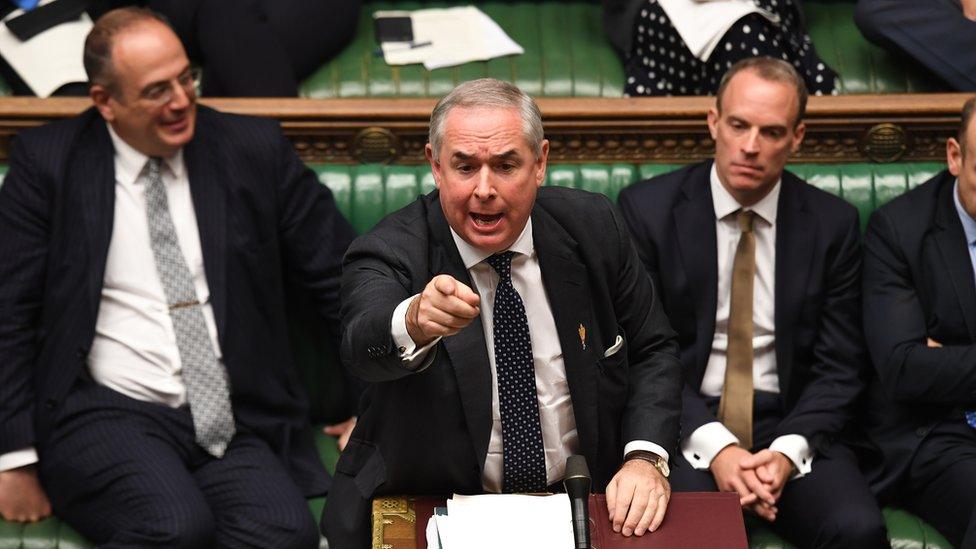The day Brexit hit boiling point
- Published
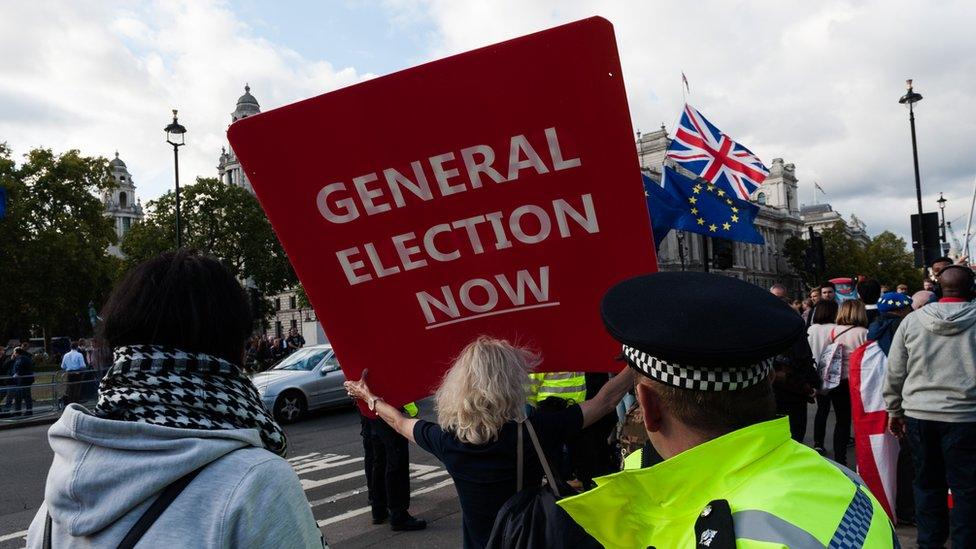
Passions were running high as MPs returned to work
The order paper was blank and MPs weren't even supposed to be in Westminster.
But the day after the Supreme Court ruled Boris Johnson's prorogation, or suspension, of Parliament was 'null and void', the cockpit of the House of Commons found itself full again.
Pitted against each other was a furious opposition who argued they had been unlawfully expelled from their place of work and an unrepentant government convinced the court had unjustly intervened and put at risk their central pledge of "getting Brexit done".
Eleven and a half hours later Parliament had been labelled "as dead as dead can be"; the prime minister likened to a tin-pot dictator and accused of inciting hatred, and there were calls for an investigation into the "toxic culture" at Westminster after some of the ugliest scenes ever seen in Parliament.
The day was 25 September 2019 and in the words of then Speaker John Bercow: "as an expression of parliamentary hostilities, this day was in a league of its own. I had never presided over anything like it before."
The prorogation
There were only a select few members of the cabinet who had had any idea about Boris Johnson's intention to prorogue Parliament.
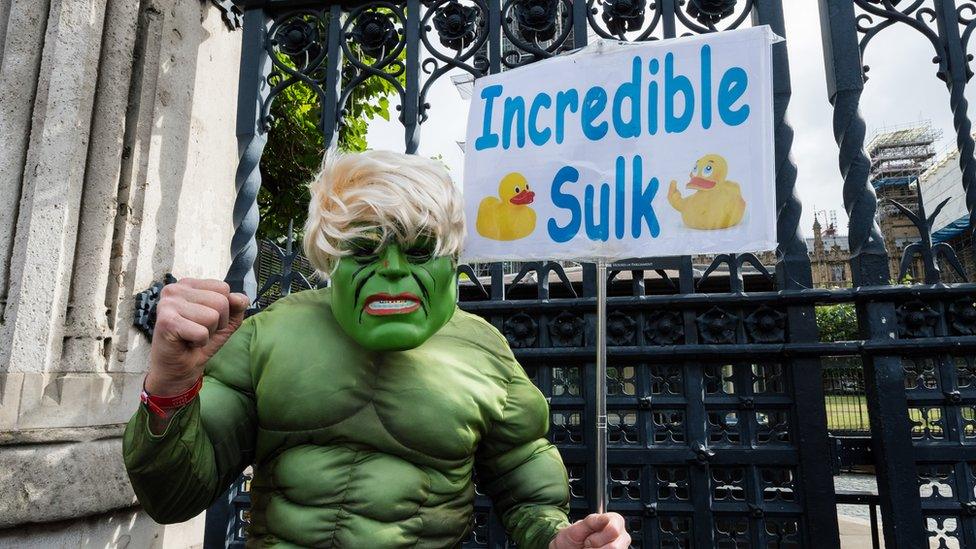
Anti-Brexit demonstrators targeted the PM
Amber Rudd, then a cabinet member in her role as work and pensions secretary, said she found out via a text from Phillip Hammond - the former chancellor who'd been banished to the backbenches by Boris Johnson.
"I called a couple of my colleagues and said 'did you know about this?' Nobody knew except the inner cabal who were acting on it."
The tall, lean figure of Jacob Rees-Mogg, the leader of the Commons, had been spotted at Aberdeen airport with other members of the Privy Council on their way to meet the Queen at Balmoral.
One Cabinet member reflects ruefully "had they not sent Jacob and someone more obscure, it may well have been that the Privy Council meeting would have just happened and none of us would have been the wiser till after the event. The whole thing was cloak and dagger."
Another former minister contends that not only were the cabinet bounced into it, the Sovereign was as well.
A morning cabinet call was swiftly organised to inform the team.
"Every cabinet minister knew it was in fact a manoeuvre in order to stop members of Parliament being able to pass a bill so we couldn't leave (the EU) without a deal on October 31," Ms Rudd recalls.
"Everyone knew it was a manoeuvre and everybody was told to go out and say something different."
Boris Johnson: 'The court was wrong'
Nicky, now Baroness, Morgan, then culture secretary, was similarly out of the loop.
"I was dumbstruck. It was basically seen as a nuclear option.
"I didn't raise my objections on that call but others did. I did in other ways and other meetings.
"But I think the prime minister was right. He had to try lots of different avenues to get things moving. At that stage the eyes of the EU were on the UK, the British government had to show we would take all measures to get this thing to happen; to show we are absolutely deadly serious about it."
The move represented a government prepared to countenance all options to get Brexit over the line.
"I do recall Jacob (Rees-Mogg) saying he was prepared to look at any manoeuvre," Amber Rudd says.
"He once told cabinet that he'd looked at the possibility of impeachment of the speaker to see if he could have a manoeuvre to stop new amendments being passed to limit no deal preparations."
The judgement
When Lady Brenda Hale delivered her withering assessment that "Parliament has not been prorogued", Boris Johnson was 3,500 miles away watching the judgement from the Westin Hotel in Times Square, New York City.
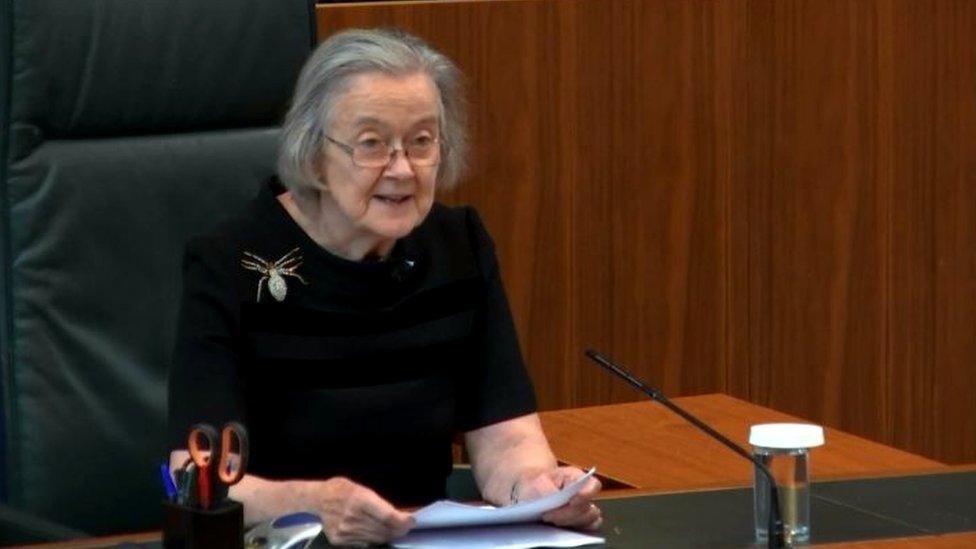
Lady Hale and her now-famous spider brooch
Travel plans were hastily being rearranged to get him back to Westminster as the prime minister was patched in on a call to a select few group of cabinet ministers and advisors. They had been sitting in conference room 1 in 70 Whitehall, jaws dropping, as they watched the Supreme Court verdict on a big screen.
"He wasn't hurt, just angry," according to one of those present on the call.
"He was cautioned against making any direct criticism of the judiciary. Had he gone to war with the Supreme Court at that moment it would have turned a drama into a crisis."
Boris Johnson's eventual public statement that morning said whilst respecting the court he "strongly disagreed" with their judgement.
Meanwhile Speaker John Bercow was in front of the TV cameras announcing that "furloughed" MPs would be back in Parliament the following morning. For Labour, this meant curtailing part of their party conference in Brighton to get everyone back.
As MPs slept before their return, the prime minister was operating on New York time attending a Commonwealth reception where he cracked jokes to delegates about his ill-disciplined Jack Russell and spoke to the United Nations General Assembly about the dangers of artificial intelligence and "limbless chickens".
His RAF Voyager plane eventually set off from JFK airport at around 04:00 GMT - herb rubbed steak and New York cheesecake served to the PM before he got some shut eye.
As he flew back the WhatsApp groups of the so-called "Remain Alliance" MPs lighting up with all involved asking: "What should the strategy be?" - the first message that day coming in at 04:50 BST.
Some wanted to bring down the government, others wanted to take control of the order paper to pass more laws, others sought valuable Brexit documents from the government.
But, with so little notice, it turned out they had no time to put a plan in place and the day played out instead with a series of urgent questions and ministerial statements.
Geoffrey Cox
As the Commons got underway at 11:30 BST, Speaker John Bercow remembers the opposition being "cock-a-hoop, celebratory and condemnatory of a government that had lost the court case".
First up to face them was the Attorney General Geoffrey Cox. As the man who had overseen the government's counsel during the court case, parliamentarians wanted to know what advice he'd given to the PM about prorogation.
Julian Smith, the then Northern Ireland secretary, and Amber Rudd had both failed in their requests to see it.
Attorney General Geoffrey Cox: "This Parliament is a disgrace"
"I wasn't calling for Geoffrey Cox's head on a plate," says the SNP's Joanna Cherry whose urgent question had brought the Attorney General to the despatch box.
"I was a little suspicious that this (legal advice) had been fed into the public domain by Dominic Cummings or someone like him in order to discredit Geoffrey Cox to pin the blame on him and take the political heat off the prime minister. I was trying to get to the politics of what was going on at the heart of that government."
Though she wasn't calling for Mr Cox to resign there were many who were. But, fighting back, the Attorney General turned the tables on Parliament itself.
His arms flailing wide - and in what Amber Rudd describes as a "Brian Blessed voice" - he said Parliament was "dead" with "no moral right to sit on these green benches".
Turning up the volume, he went on.
"Twice they have been asked to let the electorate decide, while they sit in their seats and block 17.4 million people's votes. This parliament is a disgrace.
"But the time is coming Mr Speaker, when even these turkeys won't be able to prevent Christmas."
At this stage the government had no majority, it had twice had its election request turned down by the opposition, it had yet to secure a deal with the EU and was at risk of being boxed in by laws passed by its opponents in the Commons.
But ministers stuck to their line - that Parliament was blocking Brexit.
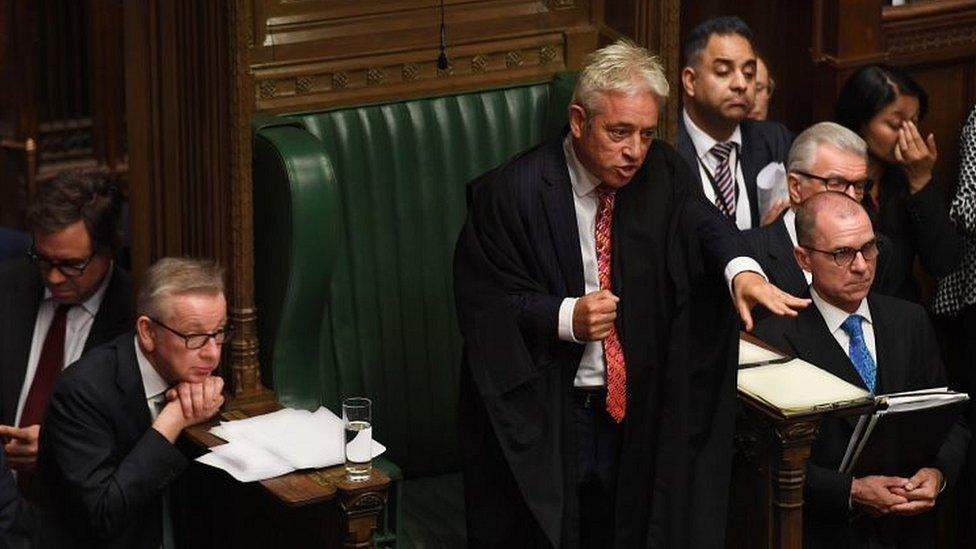
John Bercow attempts to calm the maelstrom
John Bercow said he found Geoffrey Cox's performance unimpressive.
"The dividing line between oratorical brilliance and sheer self-parody and descent into evident absurdity - not just self-parody but almost self-caricature - is thin. But that dividing line exists and my own personal view was Geoffrey fell the wrong side of the line.
"Yes he was articulate, yes he had a very good vocabulary, yes he was fluent, but I'm afraid it was done in such an overstated fashion and to be honest in manner so manifestly, medal-winningly pompous and self-important that it made him look and sound, to be candid, simply absurd."
Mr Cox himself later conceded that "perhaps I regret losing my temper in the House but I don't regret the sentiments that I expressed that found a resonance in the country."
Boris Johnson
If the Attorney General was the warm up act, then the prime minister was the main event.
When Boris Johnson stood up at 18:30 BST to face a jam-packed Commons those expecting contrition, remorse or profuse apologies were sorely disappointed.
Jeremy Corbyn says Boris Johnson is not fit for office and thinks he is above the law
Slapping away the calls for him to resign, he sought to goad opposition MPs into having the "courage" to call a vote of confidence and bring him down prompting a rapturous round of applause from those behind him, including former Conservative leader Iain Duncan Smith, who said: "Boris Johnson is ultimately an oral pugilist, he has the body shape of someone who is a fighter. That's how he took that debate."
But it was one term - used 15 times in total - that was making opposition MPs particularly furious: the Surrender Act.
It was used by the government to characterise the EU Withdrawal (No 2) Act - also known as the Benn Act - passed by the opposition MPs before parliament was prorogued. It compelled the government to request an extension from the EU to the Brexit departure date if a deal hadn't been passed by a certain date.
"I tried very hard not to use it," says then cabinet member Nicky Morgan.
"I thought there were other ways to make the case for getting a withdrawal agreement in place but I wasn't the one designing the campaigns."
The government's detractors believed language like this, as well as the tone struck earlier by Geoffrey Cox, was part of a concerted campaign ahead of any general election of pitting 'Parliament against the people' - an attempt to portray the Johnson administration as the last remaining bulwark against a remain parliament striving to overturn the 2016 referendum result.
One cabinet minister said: "That day there were two options - either go in and be overly apologetic and dull as ditchwater or you come out fighting. Boris Johnson's instinct was to come out fighting - and keep using a turn of phrase that was getting cut through with the public, whether they liked it or not."
Paula Sherriff
For beleaguered MPs some of whom were facing death threats and abuse on an almost daily basis this "pejorative language", deliberate or not, was making their lives harder.
So when Paula Sherriff, Labour MP and the constituency neighbour of murdered MP Jo Cox, stood up she told the prime minister to tone it down.
"We stand here under the shield of our departed friend with many of us in this place subject to death threats and abuse every single day. Let me tell the prime minister they often quote his words 'surrender act', 'betrayal', 'traitor' and I for one am sick of it. We must moderate our language and it has to come from the prime minister first. He should be absolutely ashamed of himself."
His response: "I've never heard such humbug in all my life."
There was uproar.
"We should not resort to using offensive, dangerous language," says Paula Sherriff.
Reflecting one year on, Paula Sherriff says she was "horrified" at the prime minister's response then and remains so even now.
"There was genuine fear there. People were saying 'oh you were screaming like a fish wife' but I say to those people 'how would you feel if you were getting emails every single day saying you should be shot or hung from a lamppost?' Put yourself in my shoes for a day and imagine how that feels.
"And I do absolutely hold the prime minister responsible for some of that - not all of it obviously - but when they're directly quoting the prime minister, unfortunately he's supposed to lead by example."
There were cries of "shame" from the opposition but Speaker Bercow decided not to intervene.
"I thought the prime minister's response was staggeringly insensitive. But staggering insensitivity doesn't necessarily constitute disorderly conduct."
The prime minister's defenders believe he and Paula Sherriff were talking at "cross-purposes", speaking past each other in the cacophony of noise in the chamber. While some Tory MPs believe that Labour MPs came to the Chamber determined to come after the prime minister personally, such was their dislike of him.
Jo Cox
But the controversy was far from over.
As the statement continued late into the evening, Tracy Brabin, the MP who succeeded the murdered MP Jo Cox, referenced her predecessor when she asked the prime minister to cease and desist his inflammatory language.
"The best way to honour the memory of Jo Cox I think is to get Brexit done," was his reply.
One MP told of her own and others' tears another said she had been contacted by the family of Jo Cox distressed at the scenes in the chamber that evening and at hearing their loved one mentioned.
Dominic Grieve, the former Conservative Attorney General, who had been kicked out of the party by Boris Johnson, said he found the prime minister's performance that evening "terrifying".
"He appeared to be implying that the best way of avoiding the death threats is you do what I say."
Just as Brexit split families across the country it also split the Johnson clan with his sister Rachel decrying her brother's conduct.
"My brother using words like 'surrender, capitulation' as if the people who are standing in the way of the blessed will of the people, as defined by 17.4 million votes in 2016, should be hung, drawn, quartered, tarred and feathered. And I think that is highly reprehensible language to use."
For the prime minister - as he said that evening - "no confected outrage or synthetic indignation" from his opponents would deter him in his central mission of getting Brexit done.
Following this bruising parliamentary session, Boris Johnson tried to exit the chamber, only to be admonished by the Speaker. "Go and sit down" he told him, with many MPs still seeking to put points of order directly to the prime minister.
But the chair was ignored and the prime minister left, later sending a text to Mr Bercow saying he intended no discourtesy.
"It was contemptuous," says John Bercow now. "The prime minister didn't care. So the post-hoc rationalisation of his position with this rather superfluous text was entirely unconvincing."
'Get Brexit done'
One year on, we know what happened next. An election, an 80 seat Conservative majority and Brexit achieved - the first stage at least.
The prime minister's team will point to that as evidence their approach was the right one and he was on the side of the public.
Sir Iain Duncan Smith maintains that the way Parliament vented on 25 September 2019 reflected the frustration in the country.
The issue had to be settled once and for all: "This debate was a moment of departure."
A cabinet minister admits: "It was horrible to go through at the time - it was like a slow motion crash - but in the end probably all the pain and suffering was really necessary to make the bigger point to the public that Parliament had run its course and needed to be replaced.
"Although it was very difficult and the parliamentary circumstances were horrible, it didn't in the end do Boris Johnson any harm when it came to the election.
"On the doorstep we kept hearing the narrative that the voters understood that prime minister had done everything possible to achieve Brexit - even suspending parliament."
Others, though, beg to differ: "The fact they won that election doesn't make it right. I thought it was a dangerous way to treat people." says former cabinet minister Amber Rudd.
"This government operates on the basis that the ends justify the means. Doesn't matter whether it's the law, doesn't matter whether it's people, doesn't matter whether it's the quality of their lives, as long as we can get there. Where do you stop?"
This day represented the apex of the Brexit fury where the divisions in the country were reflected by the furious exchanges on the green benches.
In terms of parliamentary drama - the rows, rancour and resentment - Westminster has seen nothing quite like it.
'The Day Brexit Hit Boiling Point' presented by Carolyn Quinn is on Radio 4 on Saturday 26 September at 20:00 and available on BBC Sounds.
- Published25 September 2019
